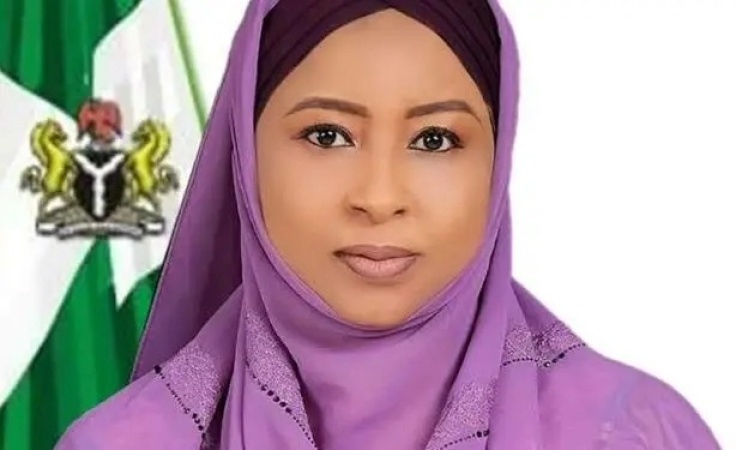![]()
Operatives of the Economic and Financial Crimes Commission (EFCC), have grilled the National Coordinator and Chief Executive Officer of the National Social Investment Programme Agency (NSIPA), Hajia Halima Shehu for hours in her office located at Maitama, Abuja.
It will be recalled that Shehu was suspended from office by President Bola Tinubu on Tuesday.
But, as of the time of filing this report, the Presidency, Office of the Secretary to the Government of the Federation, and the Minister of Humanitarian Affairs and Poverty Alleviation have yet to make any official statement about the alleged suspension of the NSIPA National Coordinator.
Shehu was expected to handover starter packs to victims of the kidney harvest at Karu Local Government Area of Nasarawa State on Tuesday.
The event was suspended following an alleged directive to that effect through a letter purportedly signed by the Minister of Humanitarian Affairs and Poverty Alleviation, Dr. Betta Edu.
Men of the anti-graft agency later stormed her office at Taraba Crescent in Maitama, to engage her in certain interrogations.
The secret meeting between Shehu and the EFCC operatives, which began at 9a.m, ended around 4:30 p.m. with the former accompanying the EFCC officials to an unknown location.
It will be recalled that before her recent confirmation by the Senate, Hajia Shehu was the National Programme Coordinator of the National Conditional Cash Transfer Office (NCTO) under President Muhammadu Buhari’s administration.
Reacting to the alleged suspension, which has not been confirmed through any official statement, the Executive Director of the Civil Society Legislative Advocacy Centre (CISLAC), Comrade Auwal Ibrahim Musa Rafisanjani, enjoined President Bola Tinubu to follow due process in handling issues relating to the suspension or removal of public officers and political appointees confirmed by the Senate.
He said there was a need to checkmate the excesses of ministers overseeing agencies and parastatals.
He emphasised the need for strict adherence to due process, arguing that any public officer and political appointees can only be suspended or removed if they are declared to be corrupt, incapacitated, or resign, as provided by existing laws.
“They (Ministers) need to coordinate and provide leadership not to create confusion and not to make the place to be effective and inefficient.
“I think it is important that all the Ministers should actually have good understanding of the roles they play because many of the Ministers because of lack of proper orientation they have not been able to grasp the work, many of them especially new appointees, they need to have the understanding and rudiments of work they are suppose to do according to our laws and according to the terms and reference given to them.
“But if any Minister feels that he or she has a quarrel or misunderstanding with another public official who he suppose to be supervising, and then takes arbitrary decision, I think that is not acceptable and that is not good.
“So we encourage the office of the Secretary to the Government of the Federation to continue to organize more capacity enhancement and leadership responsibility so that there will be harmony within the various ministers and other public official because I think lack of training and capacity enhancement is one of the major problems we have.
“That’s why some public officials are not performing; because many of them just assumed that they were appointed as Ministers to have the share of the national cake not to really do the service.
“So, there must be concerted efforts to bring back regular capacity enhancement. That’s what happens in other places; even if you are a public official and you found yourself as political appointment, you’ll still need to go through capacity engagement because everyday new emerging issues are coming and they need to know how to tackle these in the best manner.
“So, in Nigeria the training and retraining, refresher course have declined and I think it is one of the challenges that we have that is making efficient and transparent and accountable leadership to be very low and poor,” he emphasized.
Mr. Rafisanjani insisted that the government must follow proper and transparent due process on issues that warrant the suspension or removal of any appointee screened and confirmed by the Senate.
He said, “If the President appointed her and you have any cause to remove her, the Presidency should have also go through the same process of appointing and removing but if you do this as an outright thing, it would suggest that we are not a country or due process and there must be reason.
“The Constitution is very clear on how to remove a public official. If the person is not corrupt and there was no evidence of corruption, if the person is not incapacitated and there was no evidence of the person being incapacitated, or if the person has not willingly resign I think those are the key issues that our constitution always look at, on how to remove or suspend public officials.
“But you cannot just wake up and suspend somebody just like that. I think the question of security tenure, the question of ensuring that in the first place you find public officials who are competent who are qualified, who are not corrupt is the major reason why we are emphasising that government at all levels must shop for quality and those who have no deficiency in terms of their capacity and intellectual experience in the work that they are assigned to do,” he added.
Related posts
Emergency landing: No fire event, alarm falsely triggered – Air Peace
Air Peace on Thursday evening cleared the air surrounding its Port Harcourt to Lagos flight incident, saying that it was…
FG Slam Emefiele with fresh charges, prints N684.5m with N18.9bn
The Economic and Financial Crimes Commission (EFCC) has slammed a fresh charge on former Central Bank of Nigeria (CBN) governor…




